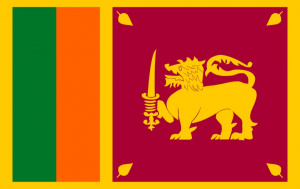Language/Sinhala/Vocabulary/Fruits
Hi Sinhala learners! 😊
In this lesson, you will learn the Sinhala words for fruits. Fruits are an essential part of a healthy diet and are also an important part of Sri Lankan culture. We will also share interesting facts about each fruit to make this lesson even more fun! Let's get started!
After mastering this lesson, these related pages might interest you: People & Booking and Checking In.
Vocabulary[edit | edit source]
Here are the Sinhala words for some common fruits along with their English translations.
| Sinhala | Pronunciation | English |
|---|---|---|
| පුල් | pul | Pineapple |
| මිරියා | miriyā | Banana |
| නෑවුම් | nāvum | Jujube |
| හරක් | harak | Papaya |
| ඇඹිරියා | ābiriyā | Mango |
| රටක් | rak | Custard Apple |
| හදලි | hadali | Starfruit |
| කොහොඹ | kohomba | Guava |
| පොලොවේට් | polowet | Wood Apple |
| කොවිල් | kowil | Jackfruit |
Pineapple - පුල්[edit | edit source]
Pineapple, or "pul" in Sinhala, is a tropical fruit that is commonly grown in Sri Lanka. Did you know that pineapples contain a digestive enzyme called bromelain, which can break down protein molecules in food?
Example dialogue:
- Person 1: මොකද pineapple? (What is pineapple?)
- Person 2: එකත් හරක්කම්. දැන් දුන්නවා තෙරුම කොහොමද? (It's a papaya. Do you know how to eat it?)
Banana - මිරියා[edit | edit source]
Bananas, or "miriyā" in Sinhala, are a popular fruit in Sri Lanka and are used in many traditional dishes. They are also a great source of potassium, which helps to maintain healthy blood pressure levels and can reduce the risk of heart disease.
Example dialogue:
- Person 1: මොකද banana? (What is banana?)
- Person 2: එකත් මිරියාමයි. උණුසුමක්ද? (It's a banana. Do you want to eat one?)
Jujube - නෑවුම්[edit | edit source]
Jujube, or "nāvum" in Sinhala, is a sweet and tangy fruit that is commonly found in Sri Lanka. It is believed to have medicinal properties and is used in traditional Ayurvedic medicine to treat a variety of ailments.
Example dialogue:
- Person 1: මොකද jujube? (What is jujube?)
- Person 2: එකත් නෑවුමයි. තමයින් මල් ආවරණයක් විදියට පත්වීමෙන් හා, දේශීය රෝහණයක්විය හැක්කේ. (It's a jujube. It can help with digestion and is also good for the skin.)
Papaya - හරක්[edit | edit source]
Papaya, or "harak" in Sinhala, is a popular fruit in Sri Lanka and is often eaten for breakfast. It is rich in antioxidants and vitamins A, C, and E, which can help to protect against diseases and promote overall health.
Example dialogue:
- Person 1: මොකද papaya? (What is papaya?)
- Person 2: එකත් හරක්කම්. මැට්ටුව ගෙඩි කියන්නේ හොදයි නැහැ. (It's a papaya. It's good for digestion.)
Mango - ඇඹිරියා[edit | edit source]
Mango, or "ābiriyā" in Sinhala, is a popular fruit in Sri Lanka and is often used in desserts and drinks. It is rich in vitamins A and C, which can help to boost the immune system and protect against diseases.
Example dialogue:
- Person 1: මොකද mango? (What is mango?)
- Person 2: එකත් ඇඹිරිමයි. තමයින් රෝගීන් කළාගේ දුරු උසාවිය වෙයි. (It's a mango. It can help to improve digestion.)
Custard Apple - රටක්[edit | edit source]
Custard apple, or "rak" in Sinhala, is a sweet and creamy fruit that is often eaten as a dessert in Sri Lanka. It is rich in vitamins A and C, which can help to boost the immune system and protect against diseases.
Example dialogue:
- Person 1: මොකද custard apple? (What is custard apple?)
- Person 2: එකත් රටක්කම්. ගෙදර ඉස්සර සහිත රෝගයක් ඇති තෙක් විදියට පත්වීමෙන් හා රෝහණයක් විය හැකිය. (It's a custard apple. It can help with respiratory infections and is also good for the skin.)
Starfruit - හදලි[edit | edit source]
Starfruit, or "hadali" in Sinhala, is a yellow or green fruit that is shaped like a star. It is rich in vitamin C, which can help to boost the immune system and protect against diseases.
Example dialogue:
- Person 1: මොකද starfruit? (What is starfruit?)
- Person 2: එකත් හදලිමයි. දෙවි දුරුන් රෝහණයක් විය හැකිය. (It's a starfruit. It can help with headaches.)
Guava - කොහොඹ[edit | edit source]
Guava, or "kohomba" in Sinhala, is a sweet and juicy fruit that is often eaten as a snack in Sri Lanka. It is rich in vitamins A and C, which can help to boost the immune system and protect against diseases.
Example dialogue:
- Person 1: මොකද guava? (What is guava?)
- Person 2: එකත් කොහොඹමයි. උණුසුමක්ද? (It's a guava. Do you want to eat one?)
Wood Apple - පොලොවේට්[edit | edit source]
Wood apple, or "polowet" in Sinhala, is a hard and fibrous fruit that is often used to make drinks and desserts in Sri Lanka. It is rich in vitamins A and C, which can help to boost the immune system and protect against diseases.
Example dialogue:
- Person 1: මොකද wood apple? (What is wood apple?)
- Person 2: එකත් පොලොවේට්මයි. තමයින් සිල්ලරමක්ද? (It's a wood apple. Do you want to taste it?)
Sources[edit | edit source]
- Sinhala Vocabulary - Fruits
- 39 Fruits in Sinhala... And I Bet You've NEVER Even Heard Of Some ...
- Fruits In Sinhala
➡ If you have any questions, please ask them in the comments section below.
➡ Feel free to edit this wiki page if you think it can be improved. 😎
Videos[edit | edit source]
Learn Japanese Fruits vocabulary |sinhala |A to Z Japan - YouTube[edit | edit source]
Other Lessons[edit | edit source]
- Verbs
- Time
- Education
- Weather
- Days of the week
- Food
- Clothes
- People
- How to Say Hello and Greetings
- Colors

